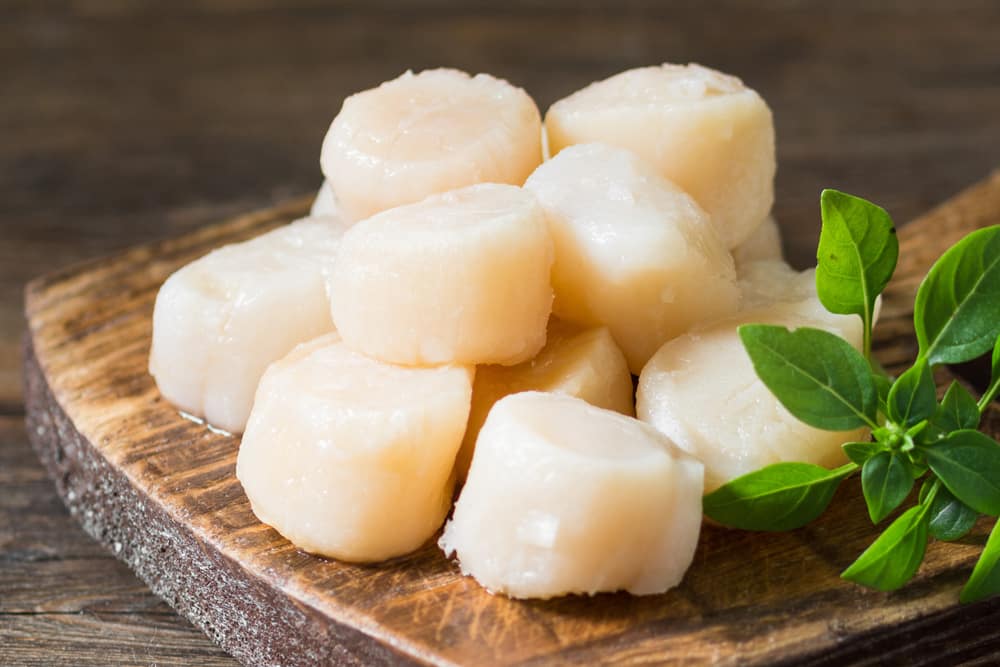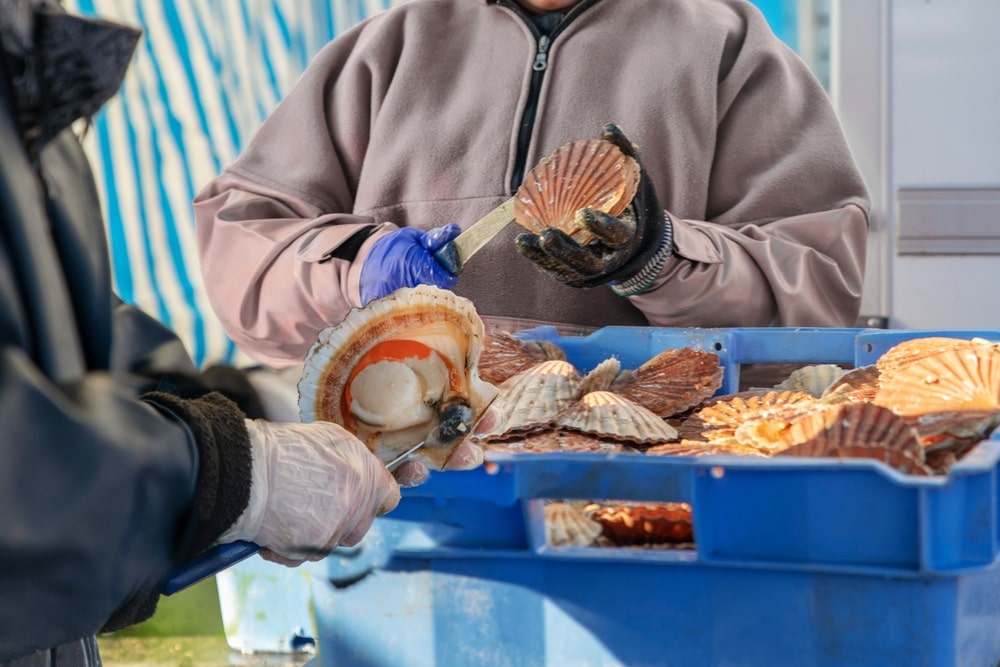
Scallops are saltwater clams that are not found in freshwater. They’re sometimes harvested from the ocean, but many today are farmed using aquaculture methods. The shells are fan-shaped, and the meaty part inside is a white, rounded disc.
Scallops are one of the easiest types of seafood to cook at home, and they just need simple ingredients to season them. They’re known as “sea candy” because of their sweet, mild flavor.
There’s no need for fancy sauces and accompaniments as these will overpower the delicate taste.
If cooked correctly, scallops are soft, nutty, and buttery – similar to lobster or crab meat.
Scallops can be awful if overcooked or not fresh, and this is the main reason that many people are too intimidated to cook them.
We give you an easy recipe at the end, but first, we’re going to look at the question many people ask, “Should scallops smell fishy?”
Should Scallops Smell Fishy?
The short answer here is “no”. A fishy smell is a sign that the scallops are no longer fresh or have been stored or transported incorrectly. Scallops, and for that matter, any seafood, should never smell fishy.
When purchasing scallops, use your eyes and nose. Fresh scallops look moist but never milky. Fishy-smelling ones often have dried or darkened edges. This is a sure sign that they are not fresh.
As for the smell, like any seafood, they should smell like the ocean – briny and seaweedy. They should not have an offensive, fishy, or sharp smell. They should also not smell strongly of iodine.
On the other hand, if the scallops at your fishmonger have no smell at all and are all a uniform white color, they have probably been soaked in sodium triphosphate (STP).
Commercial fisheries have worked out a way to stop scallops from drying out during transportation and storage – they soak them in a salt and water solution known as STP.
While this may stop them from deteriorating too quickly and getting a fishy smell, it means the scallops’ naturally briny, fresh taste is spoiled.
Also, because of the excess moisture, when they are fried, they release water and don’t sear as they’re supposed to. This makes them rubbery and steamed rather than fried. Very disappointing.
Preventing a fishy smell
To prevent your scallops from drying out, getting a fishy smell, and losing their freshness, start by buying from a reputable fishmonger.
When taking your scallops home, transport them in a cooler, preferably on ice. Avoid direct contact with the ice, however – wrap the scallops in plastic first. Once home, try to cook them the same day or within a day or two if that’s not possible.
Meanwhile, store the scallop bag in a bowl of ice in the coldest part of your refrigerator (not the freezer).
Before cooking, give the scallops a final inspection. Discard them if they have a strong fishy or pungent smell. Also, discard any that are discolored or are otherwise looking strange.
They should be a white to creamy color and smell like the sea. They should definitely not be grey or brown – these are the ones that will probably smell fishy. Sometimes, female scallops have an orange streak through them.
Buying frozen scallops is a little trickier because, of course, you cannot smell or inspect them in other ways. Don’t buy them if there is a lot of frost on the packaging, as this is a sign that they’ve been defrosted and refrozen at some point.
Ready to cook
You’ve checked your scallops for a fishy smell and other signs that they’re not fresh. If you’re satisfied that yours are good, you can go ahead and cook them.
Be careful not to rinse or soak them, as this will take away their flavor. Simply pat them dry with a paper towel.
The Bottom Line
Scallops are delicate and need proper storage to preserve their delicate, sweet flavor and soft but firm texture. If you have purchased scallops with a fishy smell, it’s best not to eat them as they are probably off.
It is not worth risking a trip to the emergency room with food poisoning for the sake of a seafood dinner. Ignore internet posts that suggest dipping them in salt, lemon juice, or vinegar solutions to remove the smell.
This might remove the odor, but it cannot make them fresh again. This is not a safe practice. We hope our article has cleared the air for you, so to speak.
Please enjoy our bonus cooking instructions below to ensure perfectly cooked scallops every time. Enjoy!
Seared Scallops in Herby Garlic Butter
Scallops cook really quickly, so if you’re going to serve them with rice or mashed potatoes (highly recommended), then prepare this first.
If you prefer not to use the flour, simply season the scallops with salt and pepper before frying them.
Ingredients (4 servings)
- A dozen scallops
- 2 teaspoons cake flour
- Salt and pepper to season
- 2 tablespoons olive oil
- 1 garlic clove, crushed
- 2-3 sprigs of fresh thyme
- A couple of lemon slices
Instructions
- Pat the scallops dry with a paper towel. (They should be defrosted.)
- Dust the scallops lightly on one side with the flour, then season with salt and pepper.
- Heat a heavy-based frying pan over a medium flame. Add the oil.
- When the oil is hot, put the scallops, flour side down, into the pan.
- Do not move them around or touch them. Just fry them for 2 minutes.
- Meanwhile, dust the top side with a little flour and seasoning.
- Turn the scallops over.
- Add the garlic and butter to the pan, swirling the pan as the butter melts.
- Cook the scallops for another two minutes, then remove them from the heat.
- Stir in the thyme sprigs and lemon slices.
- Serve at once on warmed plates.


